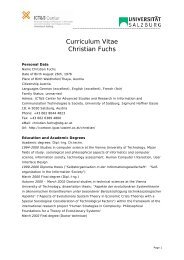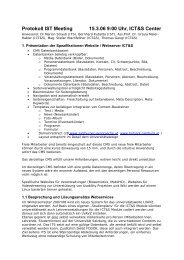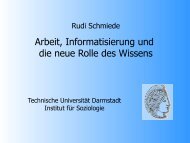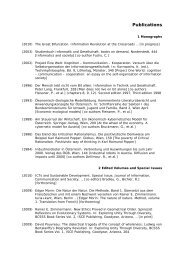ICTS AND SOCIETY: THE SALZBURG APPROACH - ICT&S
ICTS AND SOCIETY: THE SALZBURG APPROACH - ICT&S
ICTS AND SOCIETY: THE SALZBURG APPROACH - ICT&S
You also want an ePaper? Increase the reach of your titles
YUMPU automatically turns print PDFs into web optimized ePapers that Google loves.
ICTs and Society: The Salzburg Approach<br />
3 RATIONALE FOR <strong>AND</strong> HISTORICAL ADVANCES TOWARDS SHAPING <strong>THE</strong> FIELD:<br />
TECHNOLOGICAL, SOCIAL-SCIENTIFIC, <strong>AND</strong> CROSS-DISCIPLINARY ACCOUNTS<br />
Research in ICTs and Society forms the core of a science of the Information Society.<br />
3.1 The Problematique<br />
On the one hand not only the most industrialised countries, but also less<br />
developed countries, are subject to transformation processes in the sphere of the<br />
technological organisation of society, due to the development and diffusion of<br />
modern technologies which are supported and furthered by national and regional<br />
policies which set up a tremendous number of technology-advancement<br />
programmes. These policies are still confined to a view that looks upon technology<br />
as an independent factor of societal development.<br />
On the other hand there has been growing awareness that technological<br />
determinism is too myopic, since the belief in technological progress which per se<br />
entails social progress has diminished. Development in technology is not<br />
accompanied by an equally rapid growth in scientific insight, let alone foresight, as<br />
to the impacts of technology on levels of society other than that of technological<br />
organization. Attempts to observe and understand the basic nature of this change<br />
are still second place. The public use of the notion of “Information Society” has<br />
been reduced to denoting a society in which applications of modern information<br />
and communication technologies are widely spread in order to facilitate the<br />
handling of entity-like “information”. Data, however, is not the ultima ratio of this<br />
new society to come, nor even is knowledge, regardless of its quantity, as the<br />
recently EU-wide hype of knowledge-based economy and society suggests. It is<br />
wisdom which may make the emerging society a “wise society” (see the report of<br />
the HLEG 1997) that is capable of coping with challenges arising from its own<br />
development. A scientific understanding of this new form of society has not had<br />
time to develop. There is not yet a “science of the Information Society”.<br />
Nevertheless, it seems an idea whose time has come.<br />
Hofkirchner | Fuchs | Raffl | Schafranek | Sandoval | Bichler 14









